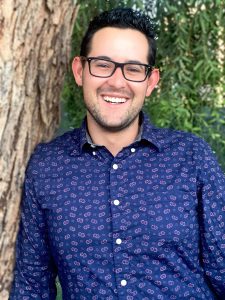
Rosti Vana, PhD is the newest faculty member to join Modern Languages and Literatures, as a Visiting Assistant Professor of Spanish Linguistics. As a first-generation graduate from Arizona State University, he specializes in sociolinguistics, where he studied U.S. Spanish in heritage speaker communities. Additionally, he has a strong background in heritage language education, qualitative research, and bilingualism. His research focuses on bridging the gap between sociolinguists and heritage language pedagogy by studying sociolinguistic issues related to US Spanish in the (advanced) mixed classroom. His dissertation—for which he was the first Spanish linguistics recipient of the Chasquí – Revista de Literatura Latinoamericana scholarship— contributes to this emerging field by being the first attitudinal study in advanced mixed classes conducted through indirect methods of analysis. By analyzing the language attitudes of both types of students toward these language varieties, he demonstrates the importance of incorporating linguistic variation into the classroom context in order to address the linguistic hierarchies that exist. the potential to make an invaluable contribution to understanding how language attitudes and instructional practices in the classroom context intersect and as such, Dr. Vana has been recently invited to contribute a chapter to a forthcoming edited volume on pedagogical best practices for the mixed classes based upon this research.
Furthermore, his experience as a second language learner adds his research trajectory. His commitment to exploring Spanish language variation has resulted in a collaborative publication in the top-tier journal, Language Awareness, where a critical discourse analysis discovered how instructor editions of Spanish textbooks portray Spanish as a monolithic construct. This line of research continues with studies relating to US Spanish in the media with a publication in Critical Inquiry in Language Studies. Dr. Vana and his co-author conducted a case study of a persona from a nationally broadcasted radio prank show, Carmen Calls by analyzing dialect stylization and language ideologies. The discourse used in these prank calls provide insight in furthering our understanding of how language in media can perhaps influence social behavior.
Other than his research interests, he enjoys being in the classroom and teaching his students about the beauty of the Spanish language and giving them all the confidence to use the language. He enjoys traveling the world, cooking, and running and he is enthusiastic about starting his journey here at UCF.